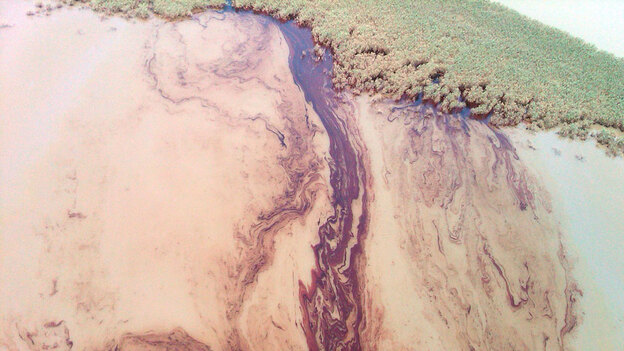This videographer has it right. The failure of the Deepwater Horizon and the subsequent rupture of the oil line is a pure environmental, social, and economic disaster, thus threatening the "triple bottom line" of sustainable life. With estimates ranging from 5,000 barrels (BP's estimate) to 70,000 barrels (independent engineers' estimates using particle velocimetry), the scope of the disaster ranges from appalling to totally overwhelming. Turtles, shrimp, crabs, fish, plankton, and too many other species to name are now collateral damage for the American fossil fuel economy.
I would hope that it is somewhat clear now that the human power to untap presents itself once again. Like the Bhopal incident in 1984, Chernobyl in 1976, the destruction of Lake Baikhal, and Lake Cayuga setting on fire, this accident shows very clearly how easily we lose control of things that we think control nature. Our ability to control what we untap and the machines we use to tap and untap is very much in doubt. In the last 3 weeks, there could be a million barrels of oil in the Gulf of Mexico.
 Who knows how much it will be in coming weeks? We do know that the coasts of Louisiana, Alabama, Mississippi, and Florida will all suffer as will everything that lives in between.
Who knows how much it will be in coming weeks? We do know that the coasts of Louisiana, Alabama, Mississippi, and Florida will all suffer as will everything that lives in between.What I wish I could say is, "The oil industry has done unprecedented damage to the Gulf." Maybe to the gulf. But it is not just the oil industry. It is most of the growth economy built on the cheapness of fossil fuels, like oil, that have precipitated this crisis. Yes. We are all to blame. BP (who is trying to limit their liability), Transocean, and Halliburton (also trying to limit their liability), and a lax Department of the Interior are more to blame than you or me. However, our addiction to oil - whether that oil comes from home or abroad - calls for us to "drill baby drill" makes this happen. This addiction, like all addictions, makes this kind of unconscionable disaster inevitable.
We all knew this (or something nearly like it) was going to happen. We all knew it would be an utter disaster. We knew this was precedented by the way we live and what we leave behind, including good sense, compassion, wisdom, and humility. Because we leave those things behind in the name of "growing our economy" and "progress," we leave behind one of the greatest single humanmade ecological disasters in history.
Some of me sees this as an opportunity. This is an opportunity to evaluate what power means and what it must be coupled with. That means looking at the power of the tools that I use in my daily life from the car to the lightswitch to the bicycle. That means looking at the power of our purse to decide what is really important in our lives as individuals seeking for the good life lived with other people and other creatures. That means looking at the power of "the economy" and leveraging it to change and probably slow down. To step back from our hubris and say that might does not equal right. I think this is an opportunity to learn, or, as some great teachers might say, grow toward the good.
Do you think we'll learn from this? I hope so. Perhaps some of us already have.
Because this is not a local issue, Mike and I will probably not spend very much time on it on the air. But know that we are thinking about it and encourage calls on the topic.
[Picture courtesy of NPR]
Several different velocimetry techniques are used at Idaho National Laboratory’s MIR Lab, including Laser Doppler velocimetry (LDV), particle image velocimetry (PIV) and stereoscopic PIV. Learn more about the world's largest flow facility here.
ReplyDeletehttp://www.inl.gov/velocimetry